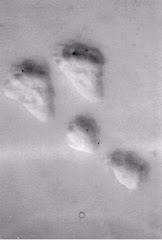Each member of the ecology classes calculated their "Carbon Footprint" which is a calculation of the number of tons of carbon produced by an individual. Students where then asked to summarize their findings and brainstorm ways in which they could reduce their footprint. The following are a few of their ideas:
Drive less (car pool, consolidate
errands, mass transit, walk or bike short trips)
Eat less meat
Buy locally (produce, etc.)
Buy organic foods
Take shorter showers
Turn off computers and surge protectors when not in use
Replace
incandescent bulbs with
fluorescentReduce, Reuse, Recycle
You can find you own carbon footprint at the following site:
http://www.carbonfootprint.com/



